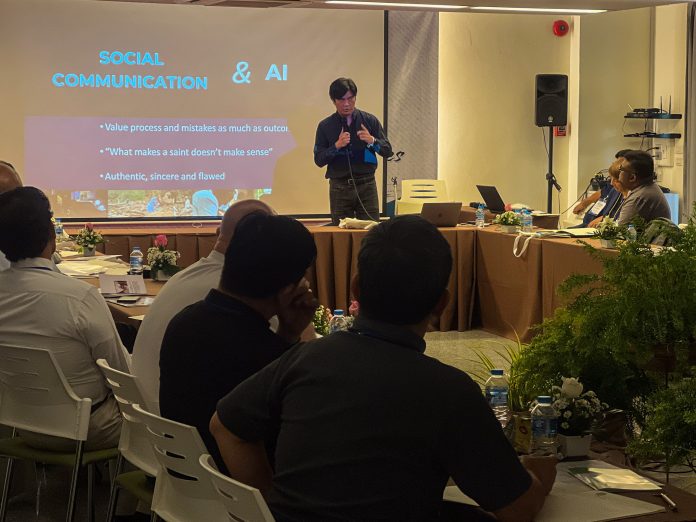We now live in the age of Artificial Intelligence (AI). Within this decade and in the years to come AI is going to radically change the world and dominate all aspects of life including the religious sphere.
Its development is unstoppable and can either be beneficial or a threat. Efforts are being made by governments and tech companies to regulate and contain AI to ensure that threats and destructive effects are avoided.
At the same, we have to learn to make use of AI to enhance and augment the capability of the Church and its members. How can AI help the Church in carrying out its mission?
How can the Church promote communion and participation in mission as prophetic, priestly, and servant people in the context of a digital world dominated by AI? How can AI be at the service of the synodal church?
AI can be a great help in carrying out the Church’s prophetic/evangelizing mission. AI platforms like ChatGPT and Copilot have access to vast data on the internet including biblical resources, Church documents, theological works, etc.
It is more than a highly advanced search engine since it can quickly and systematically summarize, analyze, and simplify any philosophical, biblical, theological, and catechetical topic.
Thus, AI can answer quickly and simply any question about the bible, Christian faith, Church teachings, etc.
There is a project called Magisterium AI which is described by Copilot: “Magisterium AI is an innovative artificial intelligence project designed to make the teachings of the Catholic Church more accessible.
It serves as a guide to Church teachings, providing answers to questions on various topics, including doctrine, practices, and Canon law.
The AI can explain complex theological, philosophical, and historical concepts in simple language, making it a valuable resource for formators, teachers of the faith, priests, and parents involved in catechizing their children.
The project is experimental and aims to create a growing dataset of Church documents and algorithms. It’s also intended to assist in educational settings by summarizing Church documents, generating theological reflections, and creating educational resources.
Magisterium AI can provide contextual information on the Church’s history, helping users understand why the Church teaches what it does.”
AI chatbots can answer questions for non-believers or those belonging to other denominations who want to know more about the Christian Faith and the Church.
As a prophetic community, the Church exercises its role as the conscience of society. This requires knowing and understanding deeply particular social issues and concerns to come out with moral judgment and take appropriate action.
AI can be useful in analyzing these issues, the facts related to these, the relevant Church teachings, and the views of experts. AI can be a tool against disinformation and misinformation.
AI can aid in drafting position papers and pastoral letters as well as suggest a course of action.
Since lay people are called to actively participate in the Church’s prophetic mission, having an AI tool in their hands can be a source of empowerment since it helps them know, understand, and communicate the Christian message.
They don’t have to rely on their own personal or private interpretation. Nor are they totally dependent on the clergy. This is very useful for lay evangelizers and catechists. This is also a great help for parents who are called to be the first catechists to their children.
AI can generate content for evangelization and catechetical modules as well as accompanying videos that can be shared on social media or face-to-face gatherings.
AI can help the priest or deacon in preparing his homily. AI chatbot can come up with commentaries and reflections on the readings of the Mass. It can also suggest ideas or themes that may focus on.
However, he should not preach a homily generated by AI which is usually based on homilies posted by other priests on the internet. Each homily should be based on the particular local context of the hearers and address their situation and concerns.
AI can also help lay people to actively participate in the liturgical celebration. AI can help them understand the readings for Masses that they are attending as well as the liturgical feasts and seasons.
The bible-reflections generated by AI can help the lay faithful in living the Word of God in their day-to-day life. AI chatbots can also provide methods for personal prayer and meditation.
For Basic Ecclesial Communities that gather regularly to celebrate, reflect, and share the Word of God, AI can be an immediate resource for leaders and members of the community to aid them in understanding the particular biblical text that they are reflecting and sharing.
The Church as a servant community has a mission of promoting integral human development and working for justice, peace, and the integrity of creation. This means addressing the problems of poverty, climate change, violence, human rights violations, etc.
This is where AI can also have a significant contribution. AI tools can be a great help in the social action ministry of the dioceses and parishes.
AI can be a resource in understanding the actual problems that need to be addressed, the various programs and courses of action that can be adopted, and the concrete ways of going about it.
This can enhance the active participation of the lay faithful as well as the Basic Ecclesial Communities in the Church’s social mission.
The use of AI should be grounded on the principles of the common good, human dignity, and transparency. For AI to be useful, its use has to be promoted and the clergy, religious, and laity should learn how to make of use it.
While keeping an open mind we have to be constantly critical-minded and not allow AI to dominate us.
Fr. Amado Picardal is a Redemptorist priest and human rights and peace advocate. He was executive secretary of the CBCP Episcopal Committee on Basic Ecclesial Communities. He also served as co-executive secretary of the Commission of Justice, Peace, and Integrity of Creation of the Union of Superiors General in Rome.









